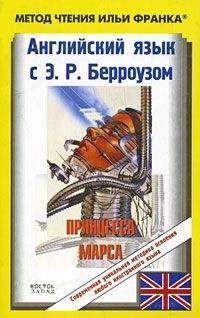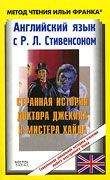sprawl [sprLl], attempt [q'tempt], variety [vq'raIqtI], mischief ['mIstSIf]
Instead of progressing in a sane and dignified manner, my attempts to walk resulted in a variety of hops which took me clear of the ground a couple of feet at each step and landed me sprawling upon my face or back at the end of each second or third hop. My muscles, perfectly attuned and accustomed to the force of gravity on Earth, played the mischief with me in attempting for the first time to cope with the lesser gravitation and lower air pressure on Mars.
I was determined, however, to explore the low structure which was the only evidence of habitation in sight (однако я был решительно настроен исследовать низкое строение, которое было единственным свидетельством обитаемости в пределах видимости), and so I hit upon the unique plan of reverting to first principles in locomotion, creeping (и поэтому я прибег к уникальному = великолепному плану — вернуться к основополагающему принципу передвижения — ползанию; to hit on smth. — найтичто-либо, натолкнутьсяначто-либо; to hit — ударить; locomotion — передвижение). I did fairly well at this (я справился с этим довольно успешно) and in a few moments had reached the low, encircling wall of the enclosure (и через несколько мгновений добрался до низкого, окруженного стеной строения).
There appeared to be no doors or windows upon the side nearest me (оказалось, что с ближайшей ко мне стороны не было ни дверей, ни окон), but as the wall was but about four feet high (но так как стена была высотой всего около четырех футов) I cautiously gained my feet (я осторожно поднялся на ноги; to gain — обрести) and peered over the top upon the strangest sight it had ever been given me to see (и заглянул через верх /и увидел/ самое странное зрелище, которое мне когда-либо доводилось видеть; to peer — заглядывать).
unique [ju:'ni:k], locomotion ["loukq'mouSn], encircling [In'sWklIN], sight [saIt]
I was determined, however, to explore the low structure which was the only evidence of habitation in sight, and so I hit upon the unique plan of reverting to first principles in locomotion, creeping. I did fairly well at this and in a few moments had reached the low, encircling wall of the enclosure.
There appeared to be no doors or windows upon the side nearest me, but as the wall was but about four feet high I cautiously gained my feet and peered over the top upon the strangest sight it had ever been given me to see.
The roof of the enclosure was of solid glass about four or five inches in thickness (крыша строения состояла из цельного стекла толщиной четыре или пять дюймов; solid — сплошной, цельный), and beneath this were several hundred large eggs (а под ней находилось несколько сотен больших яиц), perfectly round and snowy white (идеально круглых и снежно-белых). The eggs were nearly uniform in size being about two and one-half feet in diameter (яйца были почти одинакового размера и имели в диаметре около двух с половиной дюймов; uniform — однообразный, одинаковый).
thickness ['TIknIs], beneath [bI'ni:T], diameter [daI'xmItq]
The roof of the enclosure was of solid glass about four or five inches in thickness, and beneath this were several hundred large eggs, perfectly round and snowy white. The eggs were nearly uniform in size being about two and one-half feet in diameter.
Five or six had already hatched (пять или шесть уже вылупились; tohatch— вылупливаться) and the grotesque caricatures which sat blinking in the sunlight (и /вида/ гротескных, карикатурных существ, которые сидели, мигая, в солнечном свете) were enough to cause me to doubt my sanity (было достаточно, чтобы я усомнился в своем рассудке). They seemed mostly head (казалось, они состояли из одной головы: «казались преимущественно головой»), with little scrawny bodies (с маленькими тощими телами; scrawny— костлявый, тощий), long necks and six legs (длинными шеями и шестью ногами), or, as I afterward learned, two legs and two arms (или, как я позже узнал, двумя ногами и двумя руками), with an intermediary pair of limbs (с промежуточной парой конечностей) which could be used at will either as arms or legs (которые, по желанию, можно было использовать как руки или как ноги). Their eyes were set at the extreme sides of their heads (глаза их были расположены по краям головы: «с крайних сторон головы») a trifle above the center and protruded in such a manner (немного повыше центра и выступали наружу так; toprotrude— выдаваться, торчать) that they could be directed either forward or back (что их можно было направлять как вперед, так и назад) and also independently of each other (а также независимо друг от друга), thus permitting this queer animal to look in any direction (что позволяло этому странному животному смотреть в любом направлении), or in two directions at once (либо в обоих направлениях одновременно), without the necessity of turning the head (без необходимости поворачивать голову).
scrawny ['skrLnI], intermediary ["Intq'mJdIqrI], permit [pq'mIt]
Five or six had already hatched and the grotesque caricatures which sat blinking in the sunlight were enough to cause me to doubt my sanity. They seemed mostly head, with little scrawny bodies, long necks and six legs, or, as I afterward learned, two legs and two arms, with an intermediary pair of limbs which could be used at will either as arms or legs. Their eyes were set at the extreme sides of their heads a trifle above the center and protruded in such a manner that they could be directed either forward or back and also independently of each other, thus permitting this queer animal to look in any direction, or in two directions at once, without the necessity of turning the head.
The ears, which were slightly above the eyes and closer together (уши, которые находились несколько выше глаз и ближе друг к другу), were small, cup-shaped antennae (представляли собой небольшие, чашевидные отростки; antenna — антенна; усик, щупальце), protruding not more than an inch on these young specimens (которые торчали не более чем на дюйм у этих юных созданий: «образцов»; specimen — образец, образчик). Their noses were but longitudinal slits in the center of their faces (носами им служили лишь продольные щели посередине их лиц), midway between their mouths and ears (между их ртами и ушами; midway — наполпути).
There was no hair on their bodies (на их телах не было волос), which were of a very light yellowish-green color (и они были очень светлого желтовато-зеленого оттенка). In the adults, as I was to learn quite soon (у взрослых, как мне предстояло узнать позднее), this color deepens to an olive green (этот цвет сгущается до оливково-зеленого; to deepen — углублять; усиливать) and is darker in the male than in the female (и у мужчин темнее, чем у женщин). Further, the heads of the adults are not so out of proportion to their bodies (кроме того, головы взрослых не так непропорциональны по отношению к телу) as in the case of the young (как это наблюдается у детей; case — случай, обстоятельство, положениедел).
longitudinal ["lOnGI'tjHdIn(q)l], female ['fi:meIl], adult ['xdAlt]
The ears, which were slightly above the eyes and closer together, were small, cup-shaped antennae, protruding not more than an inch on these young specimens. Their noses were but longitudinal slits in the center of their faces, midway between their mouths and ears.
There was no hair on their bodies, which were of a very light yellowish-green color. In the adults, as I was to learn quite soon, this color deepens to an olive green and is darker in the male than in the female. Further, the heads of the adults are not so out of proportion to their bodies as in the case of the young.
The iris of the eyes is blood red, as in Albinos (радужки их глаз кроваво-красные, как у альбиносов; iris — радужнаяоболочкаглаза), while the pupil is dark (в то время как зрачок черный; pupil — зрачок). The eyeball itself is very white, as are the teeth (само глазное яблоко очень белое, как и зубы). These latter add a most ferocious appearance (эти последние придают особенно жестокое выражение) to an otherwise fearsome and terrible countenance (к и без того устрашающей и жуткой физиономии; otherwise — иначе; вдругихотношениях; countenance — выражениелица), as the lower tusks curve upward to sharp points (так как нижние клыки загибаются вверх, /переходя/ в острые концы; tusk — клык) which end about where the eyes of earthly human beings are located (которые оканчиваются примерно там, где расположены глаза земных людей; human beings — люди; being — существо). The whiteness of the teeth is not that of ivory (белизна зубов не такая, как у слоновой кости; ivory — слоноваякость), but of the snowiest and most gleaming of china (но как у самого белоснежного и сверкающего фарфора; china — /китайский/ фарфор). Against the dark background of their olive skins (на темном фоне их оливковой кожи) their tusks stand out in a most striking manner (их клыки выделяются самым поразительным образом; to stand out — выделяться, выступать), making these weapons present a singularly formidable appearance (придавая этому оружию особенно устрашающий вид; to present — являть, представлятьсобой; formidable — страшный, грозный).



